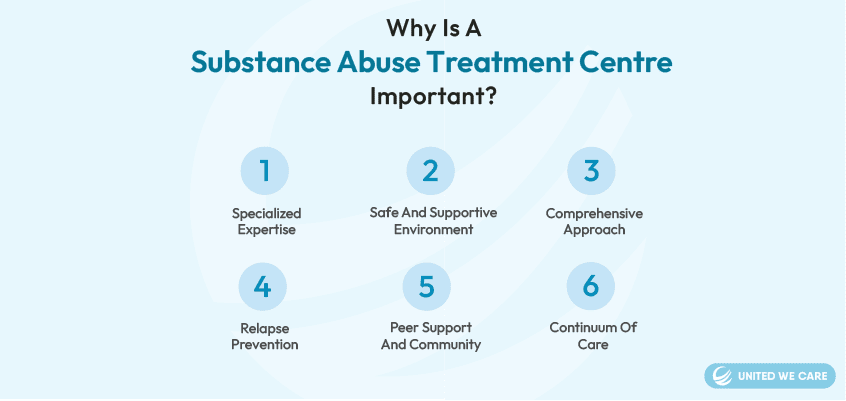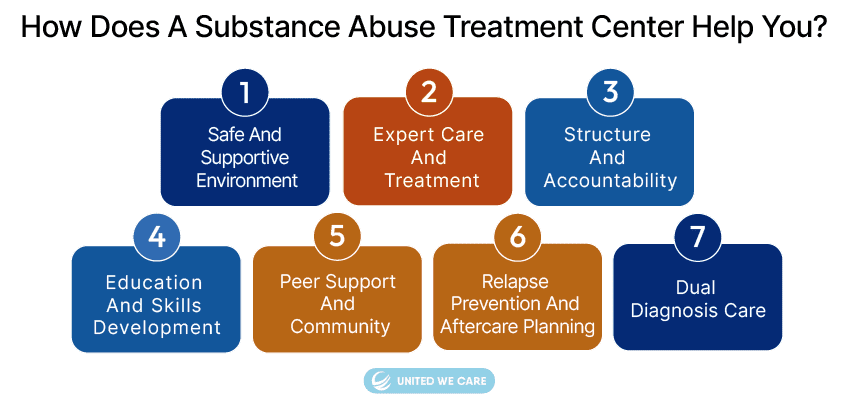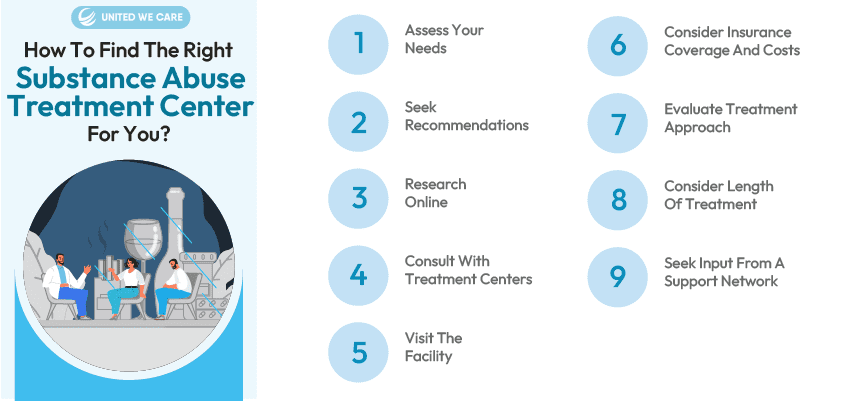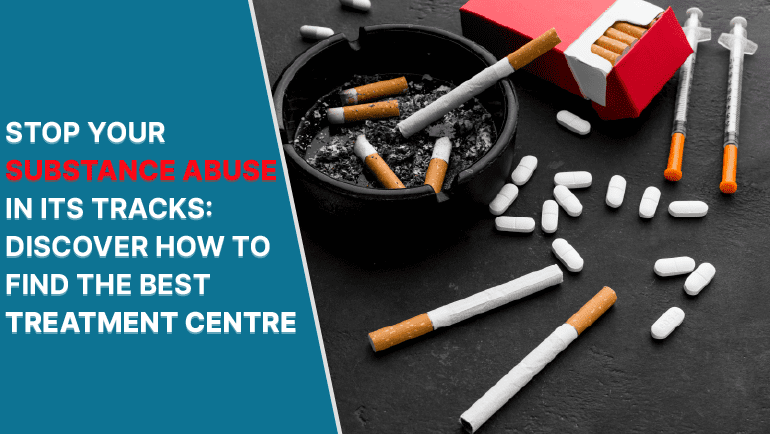Introduction
Substance abuse centers can be really helpful in an individual’s journey toward sobriety. Substance abuse centers are specialized treatment facilities equipped to help individuals with addiction move toward sobriety by educating them, providing them with supervised detoxification to deal with the withdrawal symptoms, counseling them, and using evidence-based psychotherapeutic techniques like cognitive behavioral techniques and motivational interviewing to help them to be sober for longer periods.
Read more about Substance Abuse
Why Is A Substance Abuse Treatment Centre Important?
A substance abuse treatment center is a facility that offers care and support to individuals who are struggling with addiction[1]. Services provided by substance abuse treatment centers include detoxification, individual counseling sessions, and group therapy sessions as educational programs.Here are some key reasons why these centers play a role[2]:

- Specialized Expertise: Substance abuse treatment centers have teams comprised of professionals with knowledge of addiction and recovery techniques.
- Evaluation: The center conducts assessments and evaluations to gain an understanding of each individual’s situation and tailor their treatment accordingly. This step helps determine the approach for their recovery journey.
- Safe and Supportive Environment: These centers prioritize creating a supportive environment where individuals can undergo detoxification from substances and embark on their path toward recovery. It ensures that they feel secure, cared for, and encouraged throughout the process.
- Comprehensive Approach: Treatment centers adopt an approach by integrating therapies, counseling sessions, educational programs, and support groups. This comprehensive approach addresses not only the aspects but also considers the psychological and social factors associated with addiction, leading to sustainable recovery.
- Relapse Prevention: Equipping individuals with tools and skills to prevent relapse is a component of these centers programs. Through relapse prevention initiatives, individuals learn how to identify triggers, manage cravings effectively and build resilience against setbacks.
- Peer Support & Community Engagement: Recognizing the significance of peer support in the recovery journey, treatment centers cultivate a sense of community where individuals can connect with others who’re on paths towards healing.
- Continuum of Care: Substance abuse treatment centers offer a continuum of care that goes beyond treatment programs. They provide aftercare programs along with support resources designed to assist individuals in maintaining long term recovery success.
Read more about Substance abuse and Sexual Disorder
What Services Does A Substance Abuse Treatment Centre Offer?
- Detoxification: Many treatment centers offer detoxification, ensuring individuals can safely and comfortably withdraw from substances with the support of professionals. This process helps manage withdrawal symptoms and prepares individuals for the stages of their treatment journey.
- Therapy and Counseling: Individual and group therapy sessions play a role in substance abuse treatment. Therapists use evidence-based approaches like cognitive behavioral therapy (CBT), dialectical behavior therapy (DBT), and motivational interviewing to address issues, develop coping skills, and promote relapse prevention.
- Medication-Assisted Treatment (MAT): By combining approved medications with therapy, withdrawal symptoms can be alleviated, and cravings can be. Recovery from substances such as opioids, alcohol, or nicotine can be supported.
- Education and Life Skills Training: Substance abuse treatment centers provide programs to increase understanding about addiction and its impact on individuals’ lives, as well as strategies for preventing relapse. Life skills training helps individuals develop coping mechanisms, improve decision-making abilities, and enhance functioning.
- Relapse Prevention: Comprehensive treatment centers prioritize planning to provide support for individuals’ long-term recovery journeys.
- Holistic and Alternative Therapies: Therapies such as mindfulness meditation, yoga, art therapy, and fitness programs are utilized to promote well-being, reduce stress, and facilitate healing during the recovery process.
- Family and Couples Therapy: Family therapy and couples counseling play a role in repairing relationships, fostering communication patterns, and providing support for both the individual undergoing treatment and their loved ones.
- Support Groups and Alumni Programs: Treatment centers often organize support groups like Alcoholics Anonymous (AA) or Narcotics Anonymous (NA), which offer peer support, accountability, and a sense of belonging to those seeking recovery.
How Does A Substance Abuse Treatment Center Help You?
A substance abuse treatment center provides aid to individuals grappling with addiction by offering support systems and resources. Here’s how these centers can help[4]:

- Safe and Supportive Environment: Treatment centers provide an nurturing environment for individuals to undergo detoxification procedures as they embark on their journey towards recovery.
- Expert Care and Treatment: These centers offer personalized plans that address the psychological and emotional aspects of addiction in order to deliver care.
- Structure and Accountability: Treatment centers provide a setting that helps individuals establish routines, discipline themselves and take responsibility for their actions.
- Education and Skills Development: In addition to interventions treatment centers also focus on educating individuals, about addiction while imparting them with life skills that contribute to long term recovery.When it comes to substance abuse treatment centers their main focus is to educate individuals, about addiction preventing relapse and acquiring life skills for stress management and making decisions.
- Peer Support and Community: We encourage peer support and create a sense of community. Individuals can connect with others who understand their struggles, share experiences, and provide mutual encouragement.
- Relapse Prevention and Aftercare Planning: We have to prioritize relapse prevention through tools, aftercare plans, therapy, support groups, and community networks for lasting recovery.
- Dual Diagnosis: Additionally these centers offer care for individuals dealing with both substance abuse disorders and co occurring mental health conditions.
What To Look For In A Substance Abuse Treatment Center?
Now lets discuss what factors you should consider when choosing a substance abuse treatment center:
- Accreditation and Licensing: Make sure the treatment center you choose is accredited and licensed by authorities. This ensures their legitimacy and adherence to quality standards.
- Specialized Expertise: Look for a center that has a team of professionals with expertise in addiction treatment. Their collective experience will greatly benefit your journey towards recovery.
- Individualized Treatment Plans: A good treatment center will conduct assessments to understand your substance abuse issues as well as any co-occurring disorders or personal circumstances you may have. Based on this information, they will create a customized approach tailored to your needs.
- Evidence-Based Therapies: It’s essential to ensure that the treatment center offers therapies supported by research. These evidence-based approaches have proven effective in addressing addiction-related challenges.
By considering these factors when selecting a substance abuse treatment center, you can make a decision that aligns with your needs.
How To Find The Right Substance Abuse Treatment Center For You?
Finding the right substance abuse treatment center requires careful consideration and research. Here’s a step-by-step guide to help you in your search:

When looking for a substance abuse treatment center, it’s important to consider key factors. Here’s a step-by-step guide to help you in your search;
- Assess Your Needs: Take some time to evaluate your needs, including the severity of your substance abuse, any occurring mental health conditions you may have, the type of treatment approach you desire, and your location preferences.
- Seek Recommendations: Reach out to trusted healthcare professionals, therapists, or support groups. Ask for their recommendations on treatment centers that align with your needs.
- Research Online: Dive into research to explore different treatment centers. Look for factors like accreditation, licensing information, available treatment approaches, services offered by each center, and their success rates. By following these steps and taking the time to consider each aspect of your search for a substance abuse treatment center, you can increase the likelihood of finding one that meets your needs and sets you on the path toward recovery. To make a decision about a substance abuse treatment center, there are steps you can follow. Read reviews and testimonials from others who have had experience with the treatment center if available.
- Consult with treatment centers: Ask them questions about their programs, therapies offered, qualifications of their staff, how long the treatment lasts, and what aftercare options they provide.
- Visit the Facility: Schedule a visit to the treatment center so you can personally observe the facility, meet the staff members, and get a sense of the environment.
- Consider Insurance Coverage and Cost: Check if the treatment center accepts your insurance coverage and inquire about any associated costs. It’s important to understand all aspects, such as payment options, to ensure it fits within your budget.
- Evolution Treatment Approach: Evaluate whether or not the treatment approach used by the center aligns with your preferences and beliefs.
- Consider Length of Treatment: Consider the duration of the treatment program. Determine if it meets your needs.
- Seek Input: Seek input from your support network, including loved ones, therapists or counselors, or any other individuals who can offer insights and guidance in making this decision.
Conclusion
Substance abuse centers help individuals with addiction to overcome addiction by providing them specialized services like medication-assisted therapy, psychotherapies, access to support groups, family counseling, and therapies, educating them about the impact of addiction and how neurotransmitters and other bodily and social factors play a role in making deaddiction a difficult journey and also help in equipping individuals with necessary coping techniques to deal with the cues that can impact their journey towards sobriety.
References
[1] “Substance abuse treatment facility Definition,” Law Insider. [Online]. Available: https://www.lawinsider.com/dictionary/substance-abuse-treatment-facility. [Accessed: 07-Jun-2023].
[2] “Why is it important to consider a Rehabilitation Centre,” Alpha Healing, 01-Jun-2017. [Online]. Available: https://alphahealingcenter.in/important-consider-rehabilitation-centre/. [Accessed: 07-Jun-2023].
[3] “[Solved] Which of the following are treatment offered by residential&,” Testbook. [Online]. Available: https://testbook.com/question-answer/which-of-the-following-are-treatment-offered-by-re–61c1ade7e48370870551625d. [Accessed: 07-Jun-2023].
[4] J. H. P. Minus and T. P. P. Minus, “The benefits of rehab,” Rehab Spot, 08-Apr-2019. [Online]. Available: https://www.rehabspot.com/treatment/before-begins/the-benefits-of-rehab/. [Accessed: 07-Jun-2023].
[5] E. Starkman, “How to choose the right place for alcohol or drug rehab,” WebMD. [Online]. Available: https://www.webmd.com/mental-health/addiction/features/addiction-choosing-rehab. [Accessed: 07-Jun-2023].









